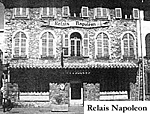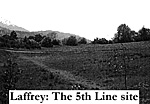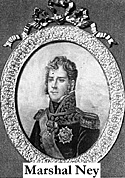 At 4:00 PM on 1 March 1815, the Emperor landed once again on
French soil. the image was great, but the reality was daunting. The cause
was not helped when Captain Lamouret foolishly took a few men and
demanded the surrender of Antibes. Instead, he and his men were taken
prisoner. Napoleon decided to ignore their plight, feeling that the first shot
fired would break the spell of his arrival and- lead to disaster.
At 4:00 PM on 1 March 1815, the Emperor landed once again on
French soil. the image was great, but the reality was daunting. The cause
was not helped when Captain Lamouret foolishly took a few men and
demanded the surrender of Antibes. Instead, he and his men were taken
prisoner. Napoleon decided to ignore their plight, feeling that the first shot
fired would break the spell of his arrival and- lead to disaster.
Napoleon chose to take the mountain road to Grenoble rather than pass close to the large garrisons at Toulon and Marseilles. This was sound military policy, and also avoided strong royalist regions. This meant leaving his cannon, carriage and sixteen supply wagons behind, and having to walk on narrow mountain roads, often in single file. Even today, the road is narrow and travel by car is slow.
It was a very mountainous trip, climbing to 2,500 feet, descending
into a valley, climbing again to 3,000 feet, all in the first day. They actually
made incredible time. At some points, soldiers had to scramble along
ravines covered with ice, with Napoleon following breathlessly. No one could
ride, and one mule fell off a cliff with 2,000 gold napoleons. 14
Along the route, Napoleon talked with peasants, soldiers and
townspeople. Many of them were surprised to see their Emperor, marching
on foot throughout the snow. While some were less than excited, others
attempted to encourage Napoleon.
Napoleon sent messages to Bonapartists in Grenoble, as it was
critical that he arrive in that city without difficulty. He also sent messages to
Marshal Massena asking for his support. These actions were very important.
One the one hand, Napoleon wanted to march in advance of the news of his
approach; on the other hand he needed to have the way prepared. He had
Cambronne sent ahead for rations, transportation and passports. 16
By now, the roads were much better, and Napoleon had his troops in fine marching order. As a fighting force they were still modest, but the emotional appeal was enormous. At Bras d'Or, Napoleon chatted with two officials. They told him that the people would be pleased to see him on the throne, provided that conscription was not renewed. Napoleon answered that 'A great many foolish things have been done, but I have come to put everything right. My people will be happy'. 17 Soon crowds of peasants were standing by the road side, cheering.
"I am your Emperor!"
After Grenoble, Napoleon was in pretty good shape. He had some
4,000 seasoned infantry, 20 cannon, a regiment of hussars and more men
arriving all the time. The citizens also seemed to be warming to his return.
Napoleon later recalled 'From Cannes to Grenoble I had been an adventurer;
in this last town I became a sovereign once again.' 22
On March 8, Napoleon left for Lyons. His confidence, and his army,
had improved, but it was still a long way to Paris. Increasingly desperate
efforts to halt Napoleon's march were being made. The comte d'Artois and
Marshal MacDonald set out to defend Lyons. The soldiers' loyalty, however,
was questionable. Their sullen refusal to cry 'Vive le Roi' told the comte
d'Artois all he needed to know, and he left MacDonald to do the best he
could. His best was not very good, as virtually all his soldiers disobeyed
orders and went over to Napoleon, whilst MacDonald himself made a hasty
retreat. 25
Once in Lyons, Napoleon began to act like a ruling monarch. He dissolved the two Chambers and called for new laws to be passed that would make his reign more constitutional in nature. 26 He wrote to Marie Louise, asking her to return to Paris on March 20, their son's birthday. He demanded that all recently returned emigrants leave the country, and arranged for trials of Talleyrand, Marmont, Augereau and others. 27
Napoleon again put forth the message that a different future awaited France: 'I was hurried on by the course of events, into a wrong path. But, taught by experience, I have abjured that love of glory. I have renounced forever that grand enterprise; we have enough of glory, we want repose. 28
Napoleon was, of course, quite aware of preparations being made to halt his advance. Marshal Massena, stationed at Marseilles, had dispatched troops against Napoleon's rear guard. These troops, however, provided no immediate threat. Ney, however, stood between Napoleon and Paris. While Napoleon did not really fear defeat, he wanted to arrive in Paris without having fired a shot; any other scenario would bring into question his claim to have returned at the demand of the people with the support of the army.
Meanwhile, as Napoleon advanced through Franche-Comte and Burgundy, areas that had prospered under the Empire, the support of the people increased. Their enthusiasm was great, and the crowds greeted Napoleon wherever he went. Napoleon was often greeted by crowds chanting 'A bas les nobles! A bas les pretres! A bas les Bourbons!' 29
As After the Battle of Moscow
Napoleon had Bertrand write orders to Ney, and Napoleon himself wrote a letter which stated, 'I shall receive you as after the battle of the Moscowa'. 30 Troops from Napoleon's entourage went forward and mingled with Ney's. Ney soon discovered that the cause of the Bourbons was not quite the effective rallying point that he had hoped it would be. He swore to fire the first shot if necessary, but this had little effect on his soldiers.
Meanwhile, he and his troops kept hearing wild stories, mostly untrue, of the great desire of France and all of Europe to see the Empire restored.
By 14 March, Ney had made up his mind to join Napoleon's adventure. He declared to his troops: 'The cause of the Bourbons is lost for ever . . . Liberty is at length triumphant, and Napoleon, our august Emperor, is about to confirm it for ever...Soldiers! I have often led you to victory; I am now going to conduct you to that immortal phalanx, which the Emperor
Napoleon is conducting to Paris. 31
Napoleon arrived at Auxerre on 17 March. He spent the day discussing his
plans with a wide assortment of people. The next day he met with Ney. The
scene must have been dramatic; certainly Napoleon must have been
pleased to have the services of 'the bravest of the brave'.
With Ney in hand, the remainder of the march to Paris was easy.
Paris was alive with Bonapartist fervour. One banner proclaimed these words
to the king supposedly from Napoleon: 'My good brother: there is no need to
send any more troops, I already have enough!' 32
Newspapers and Napoleon
Perhaps there is no better illustration of the rapid growth of
Napoleon's popularity than the following sequence of Paris broadsheets
passed on the streets to keep the citizens informed:
While additional royalist resistance was possible, Louis XVIII fled on
the night of 19 March. The next day, street vendors celebrated the return of
Napoleon by selling medals showing a bust of the Emperor and the date. 34 By evening, Napoleon had re-entered Paris, and the first phase of the One Hundred Days had drawn to a close.
Napoleon's plans had seemed correct. He avoided battles, obtained the loyalty and discipline of the troops, and made the politically correct statements necessary to reassure a populace and a military leadership weary of war. He made, however, one fatal error. He arrived in France before the Congress of Vienna had disbanded. As a result, the Allies were able to react quickly to this challenge to their 'new world order', and Napoleon marched forward to a fate described in the words of Mercy Argenteau: Back to part 1 of Napoleon's March to Paris
NOTES
This article appears in MagWeb (Magazine Web) on the Internet World Wide Web. At Grasse, he met with a mixed reception, as most were unwilling
to gamble on either the Bourbon king or the returning Emperor. In the words
of Stendhal, 'the people allows them to pass without giving the least sign of
approval or of disapproval.' 13
At Grasse, he met with a mixed reception, as most were unwilling
to gamble on either the Bourbon king or the returning Emperor. In the words
of Stendhal, 'the people allows them to pass without giving the least sign of
approval or of disapproval.' 13
 At Escragnolles on 2 March, Napoleon met with the abbe Chiris, the
parish priest, who offered him two eggs. 15 Along the way he also greeted the Prince of Monaco and remarked that they were both going home! At Castellane on March 3, the villagers had not heard of his impending arrival, but provided hot food and drink for Napoleon and his men.
At Escragnolles on 2 March, Napoleon met with the abbe Chiris, the
parish priest, who offered him two eggs. 15 Along the way he also greeted the Prince of Monaco and remarked that they were both going home! At Castellane on March 3, the villagers had not heard of his impending arrival, but provided hot food and drink for Napoleon and his men.
 Up to Gap, it had been easy for Napoleon, as he had met no serious resistance. The ultimate test of his chances for success, however, came at Laffrey, where Major de Lessart and a battalion of the 5th Line had been sent to put an end to Napoleon's adventure. Some of Napoleon's Polish Lancers engaged in discussion with members of the 5th, and most felt that there was little to fear that hostile action against Napoleon was likely. 18 De Lessart, however, insisted that he would do his duty, and this set the scene for an emotional confrontation.
Up to Gap, it had been easy for Napoleon, as he had met no serious resistance. The ultimate test of his chances for success, however, came at Laffrey, where Major de Lessart and a battalion of the 5th Line had been sent to put an end to Napoleon's adventure. Some of Napoleon's Polish Lancers engaged in discussion with members of the 5th, and most felt that there was little to fear that hostile action against Napoleon was likely. 18 De Lessart, however, insisted that he would do his duty, and this set the scene for an emotional confrontation.
 As Napoleon approached, Captain Randon ordered the soldiers of
the 5th to open fire. Nothing happened. Then Napoleon, in the words of the
local commemorative plaque, called out: 'Soldiers! I am your Emperor! Do
you not recognise me? If there is one among you who would kill his general,
here I am!' 19 Shouts of 'Vive l'Empereur!' were his answer, and the confrontation was over. Later in the day, Colonel Charles de Labedoyere surrendered the 1800 men of the 7th Line. 20
As Napoleon approached, Captain Randon ordered the soldiers of
the 5th to open fire. Nothing happened. Then Napoleon, in the words of the
local commemorative plaque, called out: 'Soldiers! I am your Emperor! Do
you not recognise me? If there is one among you who would kill his general,
here I am!' 19 Shouts of 'Vive l'Empereur!' were his answer, and the confrontation was over. Later in the day, Colonel Charles de Labedoyere surrendered the 1800 men of the 7th Line. 20
 The next challenge was Grenoble. The commanding officer refused to open the gates, but the people and soldiers, shouting 'Vive l'Empereur', tore them down and escorted Napoleon to the Hotel des Trois Dauphins. The pieces of the gate were placed under his window, with shouts of 'For want of the keys of the good town of Grenoble, here are the gates for you.' 21
The next challenge was Grenoble. The commanding officer refused to open the gates, but the people and soldiers, shouting 'Vive l'Empereur', tore them down and escorted Napoleon to the Hotel des Trois Dauphins. The pieces of the gate were placed under his window, with shouts of 'For want of the keys of the good town of Grenoble, here are the gates for you.' 21
 While in Grenoble, Napoleon engaged in some first class politicking.
He met with various public officials and stated that he no longer wanted to
expand an empire. 'I have been too fond of war; I will make war no more: I will
leave my neighbours at rest: we must forget that we have been masters of
the world....I wish to be less (France's) sovereign than the first and best of its
citizens. 23 He told the people that he was there to relieve them of the oppressive policies of the Bourbons were well meaning, but surrounded by
outrageous advisors and the hated emigrants. 24
While in Grenoble, Napoleon engaged in some first class politicking.
He met with various public officials and stated that he no longer wanted to
expand an empire. 'I have been too fond of war; I will make war no more: I will
leave my neighbours at rest: we must forget that we have been masters of
the world....I wish to be less (France's) sovereign than the first and best of its
citizens. 23 He told the people that he was there to relieve them of the oppressive policies of the Bourbons were well meaning, but surrounded by
outrageous advisors and the hated emigrants. 24
 One major obstacle remained. Marshal Michel Ney had pledged to bring Napoleon back in an iron cage. A leader in the revolt of the marshals in 1814, he had retired in great comfort, and could not have been pleased to hear of Napoleon's unexpected arrival. Determined to show his royalist loyalty and to keep France at peace, Ney began to organise a force to
oppose Napoleon's march to Paris.
One major obstacle remained. Marshal Michel Ney had pledged to bring Napoleon back in an iron cage. A leader in the revolt of the marshals in 1814, he had retired in great comfort, and could not have been pleased to hear of Napoleon's unexpected arrival. Determined to show his royalist loyalty and to keep France at peace, Ney began to organise a force to
oppose Napoleon's march to Paris.
 At right, Auxerre, where Napoleon and Ney met.
At right, Auxerre, where Napoleon and Ney met.
The Tiger has broken out of his den.
The Ogre has been three
days at sea.
The Wretch has landed at Frejus.
The Buzzard has
reached Antibe.
The Invader has arrived in Grenoble.
The General
has entered Lyons.
Napoleon slept at Fontainebleu last night.
The Emperor will proceed to the Tuileries today.
His Imperial Majesty
will address his loyal subjects tomorrow! 33 'The cannons of Waterloo sent to a lonely death,
on that rock in the Atlantic Ocean,
the powerful Genius who had filled the world with the sound of his arms,
and the grandeur of his fame!!!' 35
13 Beyle, 172
14 Houssaye, 57
15 Tulard, Jean and Louis Garros, Itineraire de Napoleon au jour de jour 1769-1821, (France, 1992) 462
16 Houssaye, 57
17 Ibid., 63. See also his proclamation to the Hautes and Basse Alpes ' the cause of the nation will triumph again!' Correspondance, 28, No 21684.
18 Thiers, V 432-433
19 The plaque reads 'SOLDATS. Je suis votre Empereur. Ne me reconnaisez-vous pas? Sil en est un parmi vous qui veuille tuer son general. ME VOILA!!! 7 Mars 1815. Translation by the author.
20 Cronin, 392, and Fleury, I 193-1 94
21 Fleury, I, 195-196
22 Octave Aubrey, Napoleon (London 1964) 331
23 Fleury, I, 198-199
24 Thiers, 434-435
25 Saunders, Edith, The Hunded Days: Napoleon's Final Wager for Victory (New York, 1964).
26 Decree of 13 March 1815 Correspondance, 28, No 21686
27 Thiers, 5, 444-446; Fleury, I, 230-250
28 Fleury, I, 231
29> Thiers, 8, 446-447 'Down with the nobles! Down with the pretenders! Down with the Bourbons!' (Translation by author)
30 Correspondance, 28, No 21689 Translation found in Saunders, 33
31 Fleury, I, 259-260 (footnote)
32 Chandler, David, Waterloo: The Hundred Days, (London, 1980, 1987) 19
33 Chandler, 19
34 Cronin, 394
35 Mercy-Argenteau, Francois Joseph Charles Marie, comte de Memoirs of the Comte de Mercy Argenteau, Napoleon's Chamberlain and His Minister Plenipotentiary to the King of Bavaria, Translated, and intro by George S Hellman 2 Vol. (New York, 1917), I, 178.
Back to Age of Napoleon No. 20 Table of Contents
© Copyright 1996 by Partizan Press.
Other military history articles and gaming articles are available at http://www.magweb.com